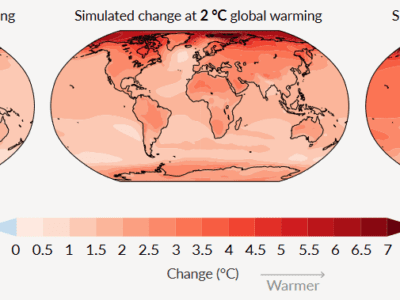Climate adaptation developments
With hopes for rapid global or domestic reductions in greenhouse gas emissions fading, the importance of adaptation becomes ever more apparent. Those responsible for protecting public health, maintaining infrastructure, and managing water and wildlife understand that they are facing enormous challenges. Policymakers, resource managers, stakeholders, and the scientific community are all beginning to respond. Here are a handful of recent developments:
- California’s Natural Resources Agency has produced the first statewide climate adaptation strategy, detailing the expected impacts of climate change on the state (including the temperature projection above) and recommending responses. The recommendations are, necessarily at this stage, very broad brush. The real value of this report is that it highlights the need to account for climate-related risks in water management, development planning and approval, energy production and distribution, and other areas. California doesn’t yet know how to deal with the climate problems it faces, but at least it is facing up to those problems.
- World Wildlife Fund has launched a blog called Climate Prep, which aims “to define climate change adaptation through illustrations of on the ground adaptation projects and scientific adaptation studies, explorations of adaptation concepts, and tracking firsthand the progress of adaptation in the policy arena.”
- The U.S. Forest Service has issued a Strategic Framework for Responding to Climate Change and directed its regional foresters to work together to prepare landscape-scale conservation plans.
- The U.S. Fish and Wildlife Service also has a strategic plan for climate change and has launched a series of Landscape Conservation Cooperatives, partnerships among scientists, stakeholders, and resource managers intended to “inform resource management decisions to address landscape-scale stressors—including habitat fragmentation, genetic isolation, spread of invasive species, and water scarcity—all of which are accelerated by climate change.”






Reader Comments